Overview: Bed Bugs in Georgia
Bed bug problems in the State of Georgia are similar to those being experienced throughout the United States. Just about every Georgia city has had an issue with one website reporting 236 reports from recent incidents.
Cities with the most recent reports include:
- Atlanta (181)
- Savannah (120)
- Augusta (69)
- Columbus (44)
- College Park (23)
- Alpharetta (28)
- Cartersville (18)
- Valdosta (28)
- Warner Robbins (24)
Source: BedbugReports
The Georgia Department of Human Resources, Division of Public Health has outlined a comprehensive program for managing and preventing bedbug outbreaks, including bedbug information resources, surveillance, education, enforcement, and assessment programs. These government programs are designed to protect Georgia residents by identifying and preventing the cause bed bug problems.
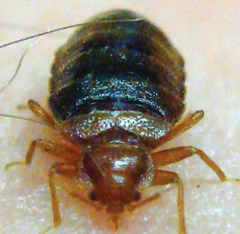 Bed Bugs can be seen with the naked eye. Signs of an infestation include seeing the insects, bites on arms, legs and the torso, and black fecal marks on mattresses.
Bed Bugs can be seen with the naked eye. Signs of an infestation include seeing the insects, bites on arms, legs and the torso, and black fecal marks on mattresses.Steps for Eliminating Bed Bugs From Your Home, Office or Apartment
Bed bugs are hard to treat. Even professionals need to treat an area up to 3 times in order to completely kill an infestation. We recommend you have a professional confirm that you have a bedbug problem since bed bugs are frequently confused with other insects.
Experienced professionals can be found in our database or by calling a network of licensed exterminators such as Home Advisor (877-233-1145).
You can also check consumer reviews on Angies List.
If the infestation is limited to one room or area you can try treating the bed bugs by buying a kit (multiple products are required) and then following the manufacturer's directions. Kits can cost up to $100 while treatment can cost up to $400 for one room and several thousand dollars if a entire home needs to be treatment.
Do not buy one spray or a fogger. Foggers just force bed bugs to flee into the walls. Store bought sprays that use pyrethroid as an active ingredient are ineffective (source: Virginia Tech University). Products mentioned on this site have been tested against insecticide resistant insects.
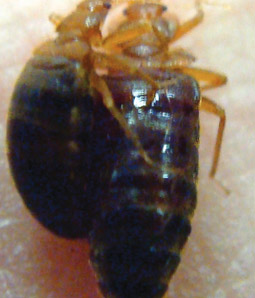 Bed Bugs Mating. It is impotant to kill any females that can lay up to 500 eggs.
Bed Bugs Mating. It is impotant to kill any females that can lay up to 500 eggs.Summary of steps:
Step 1: Clean
Remove and wash in hot water any items such as clothing. Only remove items from infested rooms in sealed bags or bins to avoid spreading the infestation. Once items are clean,
place in a sealed plastic bag. Vacuum any bed bugs that you can spot
and then dispose of the vacuum bag in a sealed plastic bag.
Step 2: Spray
Use a mattress safe knock down bed bug spray (kills on contact) such as Sterifab
(insecticide based) or Bug
Patrol
(organic bedbug spray). In general, studies show that insecticide based sprays are more effective. Be sure to spray in cracks and along seams in mattresses.
After the mattress dries, buy a zippered bed bug cover to trap any remaining bugs. It is not necessary to throw out a mattress in good condition. Also buy a bed bug cover for the box spring after treating all surfaces (inside, outside and corners - a common bedbug hiding place). Do not cover a mattress or box spring until any sprays dry.
Be sure to treat the bed frame, and
inspect/treat all areas within 10 feet of the bed. After treating the mattress, move it to a clean area and then proceed to treat the box spring. You may need to remove any bottom cloth covering. Bed bugs like to hide in tight spaces so inspect every area carefully.
Remove drawers
and treat underneath and inside furniture. After using the knock
down spray, which reduces the bed bug population, follow up with a
residual spray such as Phantom
which provides lasting protection. If you'd like to stay 100%
natural or organic, use bed bug dust instead as described below.
Tip: It is important to use a combination of products. To save money
either purchase an organic
bed bug kit or insecticide
based kit. Both types will provide the needed instructions
and products needed.
Step 3: Use Bed Bug Dust
Spread bed
bug dust around the room in a thin layer using a duster (follow manufacturers directions). If you missed any bugs during the first treatment or if any untreated eggs
haven't hatched, the dust will attach to the bed bugs shell and kill
them.
As an added step, the Georgia Division of Public Health recommends the use of a
steamer
on a mattress (and in cracks) to kill the eggs.
See our detailed instructions on eliminating bed bugs.
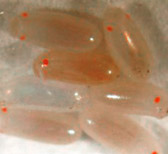 Bed bug eggs cling to surfaces with a sticky substance. Sprays must indicate that they kill bed bugs and eggs on contact.
Bed bug eggs cling to surfaces with a sticky substance. Sprays must indicate that they kill bed bugs and eggs on contact.Advice For Renters
In the State of Georgia, unless a rental agreement provides that the landlord will supply pets control, it is the responsibility of the tenant. The exception is any area or city where the local housing or health codes make it a requirement. The other exception is if the problem existed before you moved in or if the property's condition is a violation of local safety and health ordinances.
For a legal referral contact the State Bar of Georgia (404-527-8700, 800-334-6865)
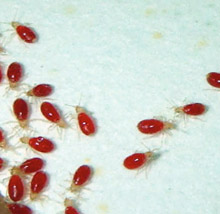 First Instars (baby bed bugs) after they have been fed a blood meal
First Instars (baby bed bugs) after they have been fed a blood mealGeorgia Hotel Law and Bed Bugs
In the State of Georgia the "Georgia Rules of Department of Public Health Chapter 511-6-2.13 Insect and Rodent Control" indicates that "Tourist accommodations must take appropriate measures to eliminate the presence of rodents, flies, roaches, bed bugs, and other insects on the premise."
Any lawsuits against an infested hotel would have to take into account the term "appropriate measures." For example, the hotel could claim that the guest brought the bed bugs into the room. Consult a local attorney to determine if your case is strong enough to overcome this ambiguity in the law.
 Signs of bed bugs include black fecal or blood marks on mattresses or furniture
Signs of bed bugs include black fecal or blood marks on mattresses or furnitureLocal News
Sleep tight.
Don't let the bed bugs bite
- WRDW.com (Channel 12)
Bed bugs invade Forest Park senior housing center
- CBS 46 Atlanta
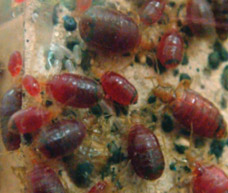 Adult Bed Bugs After Feeding
Adult Bed Bugs After FeedingBrochures
Each of these free brochures provides additional information on how to identify bed bugs in your home or apartment.
